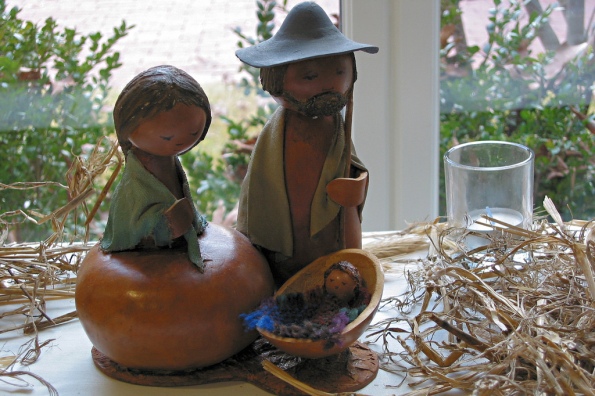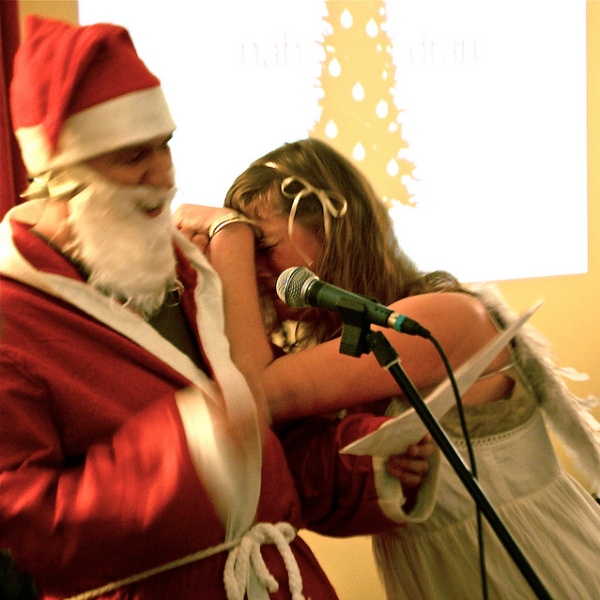
Christmas 2019
They’re pressing in through the dark to see the child. Darkness so permeates Rembrandt’s “Adoration of the Shepherds” (1657) sketch that we can barely see the image of these night visitors. As our eyes adjust, we see the faces of shepherds longing for a glimpse of the baby that sleeps between Mary and Joseph. Their leader carries a lantern to the lead way in the night: another light shines back toward the shepherds from the holy family.
When Rembrandt drew this sketch, he was already a master painter and had produced multiple images filled with striking details and vivid colors. Over thirty years earlier, he painted a stunning image of the “Adoration of the Magi,” but I am drawn to this rough sketch with just an outline of the shepherds gazing at the child.
The shepherds have traveled through the hills in forbidding night to behold this wonder. Their lantern reminds me of the blazing angels who called out to them. “Fear not” the angel declares. In one sense, this is addressed to the trembling hearts that behold the glory of God. At the same time, “Fear not,” resounds in the heart of this sullen world. Not merely the evening at hand, but the deep darkness of the age.
The shepherds survive at the bottom of a social order where human life is often treated with contempt. The Romans regularly crucify, beat, and round up Jewish suspects. At the same time, Herod, the king of the Jews, is ready and willing to kill, behead, and crush anyone who gets in his way, including the innocent children in Bethlehem when he goes looking for the newborn king.
In this mournful world, the light of God’s promise shines out with a message of Good News. The shepherds hear this great acclamation, “Glory to God in the highest, and on earth peace among those with whom he is pleased!” We also hear this word of promise.
For our world so often feels like it is dark and getting darker. Rembrandt also knew a world of striving. He had lived through the horrors of the thirty years’ war where Christians from all sides (Roman Catholic, Protestant, and Anabaptist) tortured and killed one another. He has seen the atrocities of human hearts turned against one another.
In this bleak world of human struggle, the shepherds hear the word of promise, the word of peace on earth, the word of Shalom, of restored well-being, of all creation brought into the proper harmony with God and one another. Shalom points to a day of justice for all: all wrongs made right. Isaiah sees even enemies coming together in love. What a word of hope for our age and our day and even our nation.
The angels do not simply proclaim peace but begin with the pronouncement, “Glory to God in the highest.” Joseph Ratzinger suggests that this is vitally connected to the promise of peace. He writes, “This is what Bethlehem teaches us about peace: peace among men comes from the glory of God.” (Benedict XVI, The Blessing of Christmas, trans. Brian McNeil (San Francisco: Ignatius Press, 2007), 104.)
The shepherds set out to behold this wonder, this promise of peace, this newborn king who is a Savior to his people. The shepherds set out to behold the “Glory of God in the face of Jesus.” This is a glory that shines out in the deepest gloom, in the pitch-black night. This is a glory that overcomes the dark.
Now, as we gaze with the shepherds at the babe lying between Mary and Joseph, we are seeing the glory of God revealed in the humiliation of Jesus. According to Philippians 2, the Son of God has humbled himself, emptied himself, taking the form of a servant, being born in likeness as a man. Philippians continues, “And being found in human form, he humbled himself by becoming obedient to the point of death, even death on a cross.” (Php 2:8).
Even as we behold the glory of God revealed in the baby Jesus, we are beholding the coming glory of His life poured out in the cross. As Jesus prays in John 17, “Father, the hour has come; glorify your Son that the Son may glorify you, since you have given him authority over all flesh, to give eternal life to all whom you have given him.” (Jn 17:1–2).
Thus on this night of nights, the shepherds behold the day of days. They encounter the “Glory to God in the highest.” They see the hope of all things made new in Christ. They behold the love that conquers the divide of sin and death, and the same love will bring and even is bringing peace, shalom to all the world.
As I continue to gaze with the shepherds in the darkness, I see the glimmering light that will not be put out. Amid wars, political in-fighting, human striving for power on all sides, violence and poverty around the globe, I see the promise of God in Christ Jesus. On this day of days, I rejoice and sing with the angels, “Glory to God in the Highest.” He has not forsaken or forgotten us or those who suffer in various ways across our world.
Now it is time set out with the shepherds who according to Luke, “made known the saying that had been told them concerning this child.” (Lk 2:17). May we all go forth with the word of the angels on our lips even as our lives follow in the way of Jesus Christ whose life is poured out for the life of the world.
“Glory to God in the highest, and on earth peace among those with whom he is pleased!”



